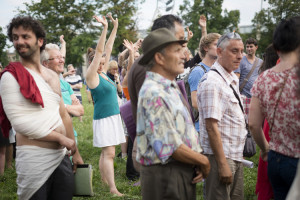Beginning of the end for anti-Gypsyism?

On Wednesday, the European Parliament passed a resolution on establishing a European Roma Holocaust Memorial Day on 2 August, and took a courageous and principled stand against what is known as anti-Gypsyism, the vicious brand of racism levelled at Roma people everywhere. This resolution marks much more than just a day of remembrance. It could lead to a watershed moment not just for Roma but for Europe as a whole, in ending its shameful complicity with what may well be the last acceptable form of racism.
The European Parliament’s document includes strong and unequivocal statements about anti-Gypsyism; it highlights the historical genesis of this form of racism. Crucially, it speaks to the importance of not blaming Roma for failing in a racist society, but instead looking at wider historical and structural causes for their struggles; about the multiple discrimination that affects Roma communities; and points to dialogue as a way of resolving racism. This marks a big shift in the debate around Roma, away from seeing them as just another section of society living in poverty, and towards facing and confronting the anti-Gypsyism that is the root cause of it.
The resolution was championed among others by Damian Draghici MEP (Romania) and Soraya Post MEP (Sweden), the only two sitting Roma MEPs; but it is based on the tireless work of many Roma activists, and on the truly impressive and growing Romani Movement.
In the European Parliament, it passed with an overwhelming majority of votes. Someone whose work has certainly contributed to bringing about this change is the Green Party’s very own Jean Lambert MEP for London.
Speaking to Bright Green about a cause she has personally supported for a long time, Jean Lambert MEP for London said:
‘On an August night in 1944, almost 3000 Roma, mostly women, children and elderly people, were murdered at Auschwitz-Birkenau. By making 2 August European Roma Holocaust Memorial Day we commemorate them as victims of the genocide, and re-double efforts to end persecution and promote equality.
At present, Roma are still subject to prejudice in education, employment , housing – every aspect of their lives. And some politicians in some countries see nothing wrong with this indeed, they promote it and, shamefully, even get elected. All EU governments must adopt policies that promote the safety, welfare, and equal opportunities for their Roma citizens.’




Leave a Reply